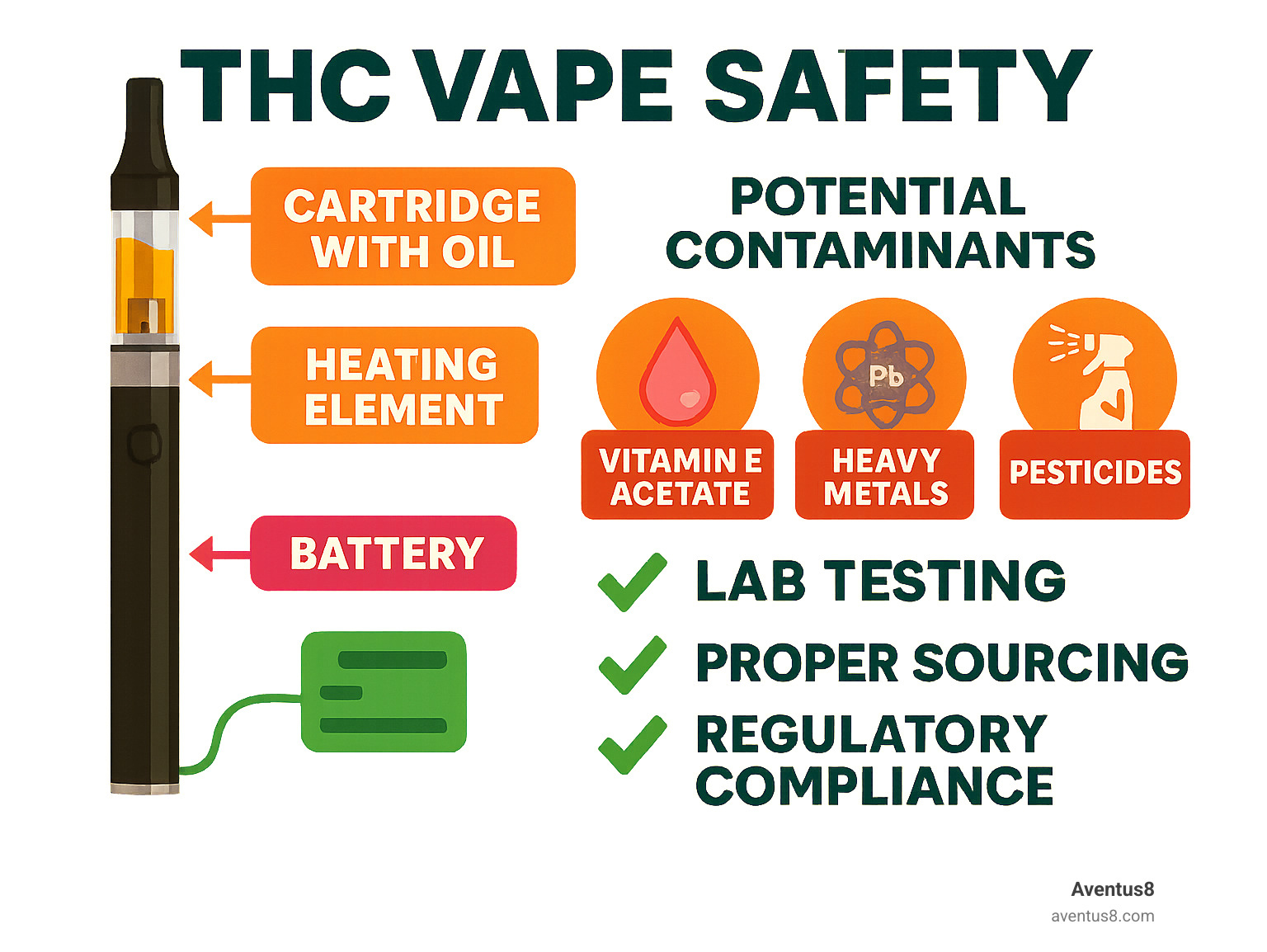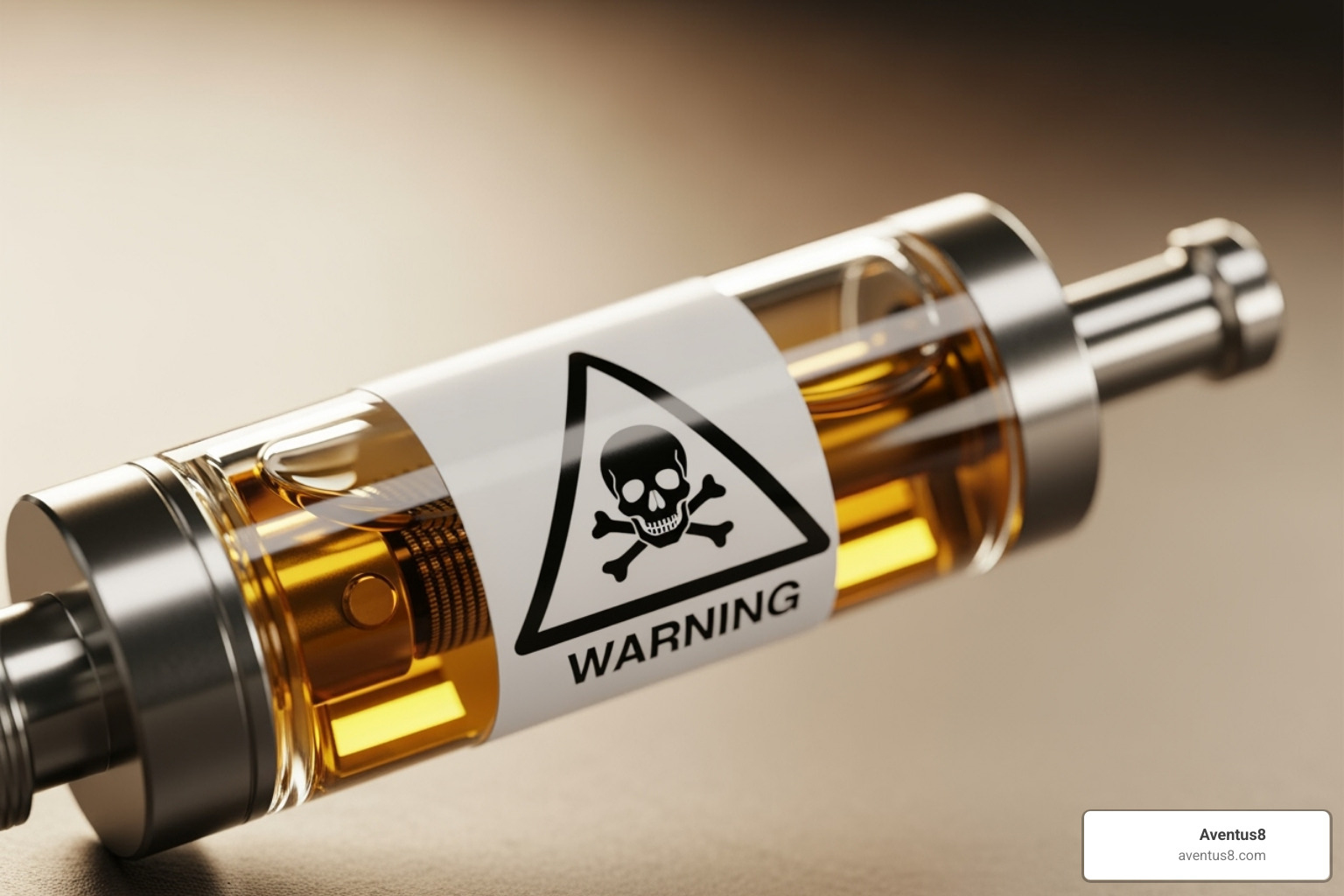Is Your Vape Safe? Unpacking the Truth About THC Vape Health Risks
Why THC Vape Safety Matters More Than Ever in Hollywood, FL
THC vape safety has become a critical concern as vaping popularity explodes across Hollywood, FL and beyond. With the convenience of discreet consumption and the appeal of high-potency products, many health-conscious consumers are turning to THC vapes without fully understanding the risks present in the South Florida market.
Key THC Vape Safety Concerns:
- EVALI outbreak - A national crisis that directly impacted Florida, with nearly 70 deaths confirmed from vaping-related lung injuries.
- Vitamin E acetate - Dangerous thickening agent found in 82% of hospitalized cases, often used in black market products available locally.
- High potency risks - THC concentrations up to 95% vs. 17-18% in flower, a significant jump for many local consumers.
- Unregulated products - A significant issue in Hollywood, with risks of heavy metals, pesticides, and toxic additives from untested sources.
- Youth vulnerability - A 7-fold increase in teen cannabis vaping from 2013-2020, a concerning trend for Hollywood families.
The 2019 EVALI crisis served as a wake-up call, with over 2,500 hospitalizations linked to contaminated vape products. Florida was one of the states affected, bringing the danger of unregulated vapes right to our doorstep. More than three-quarters of cases involved THC products, many purchased from unregulated sources.
For Hollywood, FL residents, this means understanding the difference between lab-tested, compliant products from licensed dispensaries and potentially dangerous alternatives flooding local smoke shops and online markets. The convenience of vaping shouldn't come at the cost of your health.
I'm Max Shemesh, CEO and founder of Aventus8, where I've dedicated years to ensuring THC vape safety through rigorous quality standards and compliance practices in the hemp industry. My experience has shown me why sourcing matters when it comes to cannabinoid products.

Handy THC vape safety terms:
The Hidden Dangers: What's Really Inside Your THC Vape?

Picture this: you're enjoying a sunny afternoon in Hollywood, FL, thinking your sleek vape pen is a clean, modern way to consume cannabis. But what if I told you that cartridge might contain more than just THC?
The EVALI outbreak of 2019 was a harsh wake-up call for the vaping community. This mysterious lung illness didn't discriminate – it struck people across 29 states, including right here in Florida. Nearly 70 people lost their lives, and over 2,500 were hospitalized with severe lung injuries.
Here's the shocking part: 82% of EVALI patients had used THC-containing products. Many of these folks thought they were making a safer choice by vaping instead of smoking. The reality? They were inhaling dangerous chemicals that had no business being in their lungs.
For Hollywood, FL residents, this crisis highlighted a scary truth about the unregulated cannabis market. When products aren't properly tested or regulated, you're essentially playing Russian roulette with your health. The convenience of grabbing a cheap cartridge from an unreliable source can come with devastating consequences.
The CDC's investigation revealed that most cases involved products purchased from informal sources – street dealers, friends, or unlicensed online sellers. This is exactly why THC vape safety depends so heavily on choosing reputable, lab-tested products.
The Vitamin E Acetate Crisis Explained
At the center of this health crisis was a seemingly innocent ingredient: vitamin E acetate. You might recognize this name from your skincare routine or vitamin supplements, where it's perfectly safe. But when heated and inhaled? That's a completely different story.
Unscrupulous manufacturers were using vitamin E acetate as a thickening agent in their THC cartridges. Why? It made cheap, thin oils look like premium, thick concentrates. It was the perfect way to cut corners and boost profits – at the expense of consumer safety.
When you heat and inhale vitamin E acetate, it can coat your lungs with a sticky residue that interferes with normal lung function. The CDC found this substance in the lung fluid of every single EVALI patient they tested. That's not a coincidence.
Here in Hollywood, FL, the temptation to buy cheaper products from questionable sources is real. But the vitamin E acetate crisis shows us exactly why sourcing from trusted, regulated providers isn't just smart – it's potentially life-saving. At Aventus8, we've seen how proper testing and quality control can prevent these dangerous additives from ever reaching consumers.
Contaminants Beyond Vitamin E
Unfortunately, vitamin E acetate was just the tip of the iceberg. The wild west of unregulated cannabis products has revealed a troubling array of contaminants that can end up in your vape cartridge.
Pesticides represent one of the most common dangers. While Florida's licensed medical marijuana treatment centers must test for a specific list of pesticides, the products found in unlicensed Hollywood smoke shops or from street vendors bypass these safety checks entirely. During the extraction process, these pesticides become concentrated in the final oil. What might be a small amount on the plant becomes a much larger, potentially toxic dose in your cartridge.
Heavy metals like lead, chromium, and nickel can leach into your vapor from the heating elements and other hardware components. This is a particular concern with the cheap, disposable vapes that are popular in tourist-heavy areas like Hollywood Beach, where the hardware is often mass-produced with little to no quality control. These metals become especially problematic when heated to high temperatures, creating tiny particles that you'll inhale with every puff.
Residual solvents from the extraction process present another hidden danger. Butane, ethanol, and other chemicals used to extract THC from cannabis plants should be completely purged from the final product. Again, this is a problem of regulation. Licensed Florida producers are required to prove their products are free of harmful residual solvents, but for the illicit market supplying some Hollywood consumers, there are no such requirements.
Perhaps most concerning are flavoring chemicals like diacetyl, which has been linked to "popcorn lung" – a serious, irreversible lung condition. While more common in nicotine products, these dangerous flavorings can sneak into THC cartridges too, especially in brightly-packaged products designed to appeal to younger consumers in places like the Hollywood Beach Broadwalk.
For Hollywood, FL consumers, the message is clear: THC vape safety requires more than just trusting what's on the label. Without the rigorous lab testing and regulatory oversight mandated for Florida's legal cannabis products, you're taking unnecessary risks with every puff. This is why we emphasize transparency and third-party testing – so you know exactly what you're putting in your body.
Vaping vs. Smoking Cannabis: A Health Risk Comparison
When it comes to THC vape safety, many people in Hollywood, FL assume that vaping is automatically the healthier choice compared to smoking cannabis flower. While this isn't entirely wrong, the reality is more nuanced than most consumers realize.
The fundamental difference lies in how each method delivers THC to your system. Smoking cannabis involves combustion - literally burning the plant material at temperatures around 800-900°F. This process creates tar, carbon monoxide, and dozens of carcinogenic compounds that you inhale along with the THC. Think of it like the difference between a campfire and a tea kettle - one creates smoke and ash, the other creates vapor.
Vaping THC, on the other hand, heats cannabis oil or flower to much lower temperatures (typically 315-440°F), creating an aerosol rather than smoke. This avoids the combustion process entirely, which sounds great in theory. But here's where THC vape safety gets complicated for Hollywood, FL consumers.
| Feature | Vaping THC | Smoking Cannabis |
|---|---|---|
| Health Risks | EVALI risk from unregulated products; unknown long-term effects from aerosol particles; potential heavy metal contamination | Tar, carcinogens, carbon monoxide; respiratory irritation; established combustion-related risks |
| Potency | Extremely high (up to 95% THC concentration) | Moderate (typically 15-25% THC) |
| Byproducts | Aerosol particles, potential chemical additives, heated metal particles | Tar, ash, carbon monoxide, combustion toxins |
| Discretion | Minimal odor, portable, easy to conceal | Strong odor, visible smoke, requires more setup |
Why Potency Matters
Here's something that catches many Hollywood, FL residents off guard: vape cartridges can contain up to 95% THC, compared to the 15-25% you'd typically find in cannabis flower. That's like comparing a shot of vodka to a light beer.
This massive potency difference means faster onset times and much stronger effects. What feels like a small puff can deliver an overwhelming dose, especially for newer users. The concentrated nature also means you're more likely to develop tolerance quickly, requiring larger amounts to achieve the same effects.
For many consumers, this high potency becomes a double-edged sword. While you need less product per session, the risk of adverse effects - including anxiety, paranoia, and in some cases, cannabis hyperemesis syndrome - increases significantly.
The Unknowns of Long-Term Vaping
Here's what keeps me up at night as someone deeply invested in THC vape safety: we simply don't have long-term studies on what inhaling heated cannabis oil does to your lungs over years or decades.
Unlike smoking, where we have extensive research showing the health consequences, vaping is still relatively new. We're dealing with aerosolized particles that may behave differently in lung tissue than smoke particles. The heating elements in vape pens can potentially release metal particles that wouldn't exist in traditional smoking.
From our perspective here in Hollywood, FL, this uncertainty means being extra cautious about product quality and sourcing. The chemical byproducts from heating elements and the long-term effects of inhaling concentrated cannabis oils remain largely unstudied.
While vaping likely poses fewer immediate respiratory risks than smoking, it's not the risk-free alternative many believe it to be. The key is understanding these differences and making informed choices about your consumption method and product sources.
